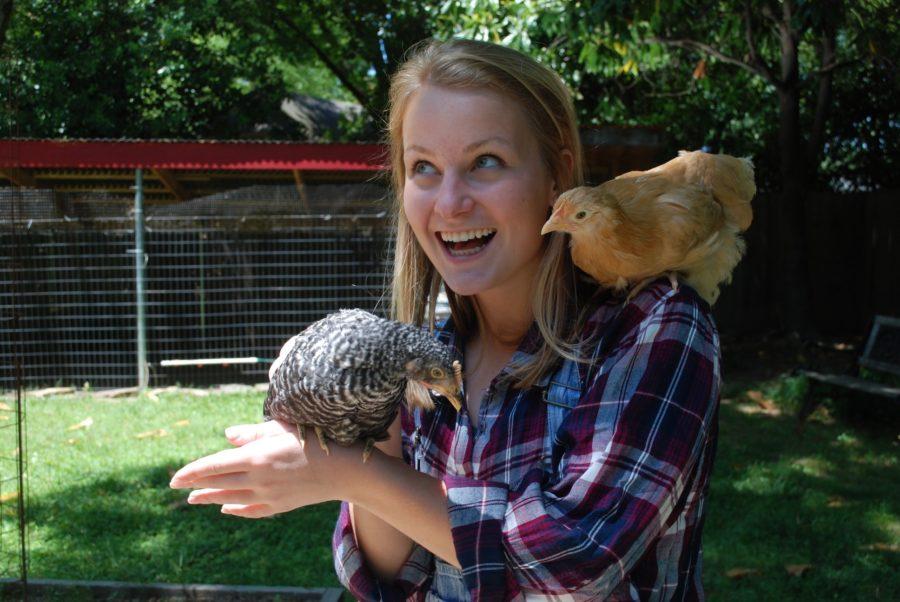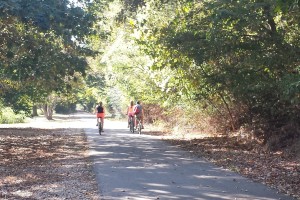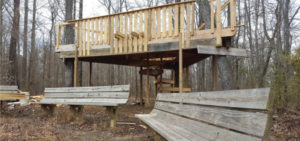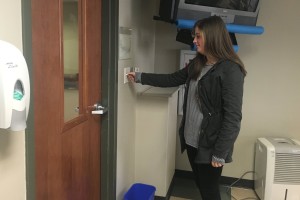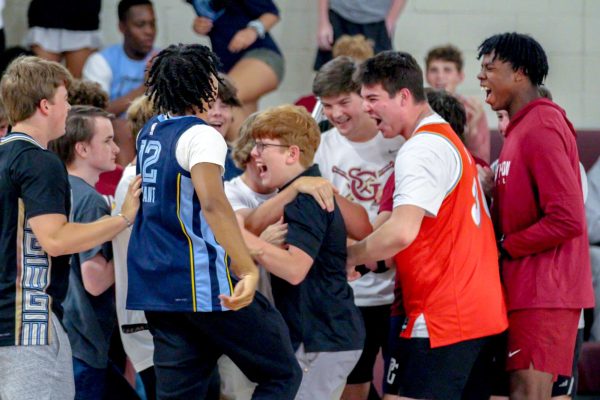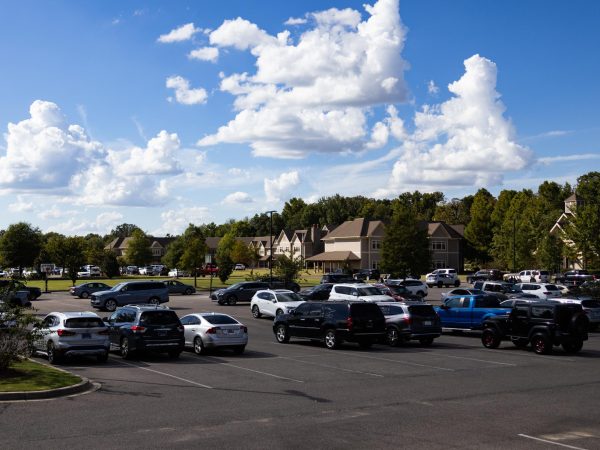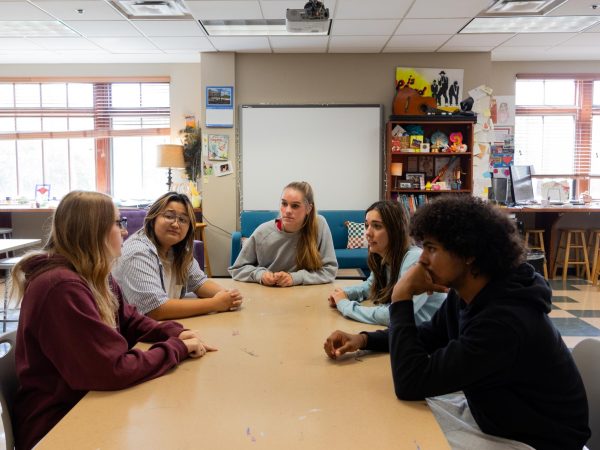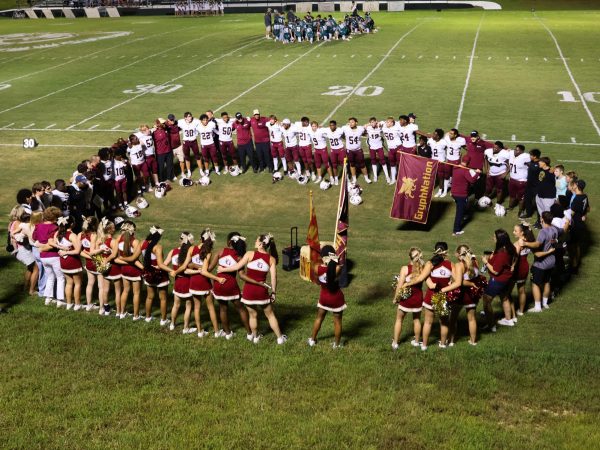The Birds and The Bees
Senior SIS welcomes new vegetables, livestock to campus
It’s hot. The sun is shining, and I can hear the wind in the grass and birds chirping around me. Instead of walking through busy hallways and making my way through the noisy crowds, I am surrounded by nothing but nature: the yellow flowers ahead of me, the hoophouse harvesting new vegetables on my right and the newly-built treehouse across the pond. I’m at peace.
In the midst of the serenity, junior Channell Cole and Dr. Rusty Horton, father to junior Shane Horton, clumsily put on their beekeeper suits. They make their way to the bee box on the bench, light the smoker and open up the box. They have one mission: to inspect the bee box and add in the queen excluder, which prevents the queen from laying eggs in the honey super, where the honey is being made. Now when Cole harvests the honey, the bee eggs won’t be mixed in with it.
Cole heads out in her beekeeper suit to check on her bees after school weekly and attends Beekeeper Association meetings at the Agricenter the second Monday of every month. Juniors Cole, Horton, in charge of the chickens, and Anna Besh, leader of the hoophouse, are taking on these new responsibilities for their Senior Independent Study project (SIS), The Birds and The Bees, but their journey to this new leadership started last year with Suburban Farms.
Founding the Farm
Before The Birds and The Bees was launched, seniors Harrison Schutt and John Kutteh were leading Suburban Farms as their SIS project. Located behind the baseball fields, Suburban Farms is a hoophouse that was built from the dirt up and is now home to multiple types of vegetables that are currently being harvested, maintaining a sustainable garden for the St. George’s community.
Schutt brainstormed the idea of building a hoophouse the summer before his tenth grade year and picked the idea back up with Kutteh when he realized he needed an SIS. However, the premise of their SIS shifted from Schutt’s original idea once they began working.
“It was pretty elaborate, and I didn’t really know how hard it was going to be to physically build a hoophouse,” Schutt said. “I really wanted to have a solar irrigation system out of the pond and a composting system at school, a lot of great ideas, [but] not realistic for us to do.”
Despite the unexpected difficulties, the boys informed students on their progress almost weekly in chapels, whether they had good news, like completing the hoophouse, or bad news, such as when thunderstorms halted their progress.
Now that the hoophouse is completely constructed and vegetables are being harvested, the Suburban Farms crew is now shifting their focus to The Birds and The Bees.
Cole, Horton and Besh pitched the idea of The Birds and The Bees, a sister project of Suburban Farms, at the end of January. The idea emerged first from Horton after helping her dad with the garden in their backyard, which has been home to chickens for about five years and bees for two years.
“I’ve watched him through this process, and I was like, ‘Y’know, it’d be so cool if I got to bring this to St. George’s,” Horton said. “Harrison and John had already had the garden, but I wanted to do something new, and I knew that I couldn’t do it by myself.”
Seeking a partner, Horton reached out to Cole with her idea of bringing chickens and bees to Suburban Farms, since she knew of Cole’s love for animals. Around the same time, Besh approached Schutt about bringing bees to Suburban Farms, and a team was born.
Beginning The Birds and The Bees
Once the three came together, they immediately began meeting with SIS adviser Mr. Jamie Roszel to figure out the logistics of integrating The Birds and The Bees onto the St. George’s campus.
“We had to get a lot of initial answers. They were really enthusiastic at first, and then we talked about it, and there were a whole lot of questions,” Mr. Roszel said. “How close are [the bees] to the school? How close can they be to people’s houses? What do we do if all the chickens die? How do we keep that from happening?”
After they developed a concrete plan and spoke with Mr. Bill McClain, the Program Coordinator for St. George’s Great Outdoors, Cole, Horton and Besh approached Head of School Mr. Ross Peters about their ideas for chickens and bees. This would become their first roadblock.
“Convincing Mr. Peters was the hardest [part],” Cole said. After the first meeting, Mr. Peters agreed to letting them have bees, but he denied the chickens out of the fear that they could all die.
But the group would not take that as a final answer.
“You can’t have The Birds and The Bees if you don’t have both the birds and the bees,” Besh said.
“They immediately kind of wanted to give up on it, but that’s where I said ‘just take that as your first obstacle,’” Mr. Roszel said. “‘Now, you need to re-double your efforts and come back and have something else to offer, and know that you can keep pushing through with this because you know it’s a good idea.’”
The girls planned to meet with Mr. Peters again, but this time, they met with almost every science teacher, anticipated Mr. Peters’ possible concerns with Mr. Roszel and Mr. McClain and created a PowerPoint presentation with 20 slides.
“We were like three slides into the presentation, and he was like ‘Okay, you can do it,’” Cole said. “I think he just needed to see how serious we were about it.”
Now, the team behind The Birds and The Bees is proceeding head-on and running their SIS as a real company. Not only do they meet regularly to discuss their progress and talk everyday via their group chat, but they’re also looking for new “employees.”
Junior Ben Stamps was hired on as their financial officer, and he is currently handling their budget, brainstorming ways to make money and even looking to file The Birds and The Bees as an LLC. Now, they are searching for a junior who is looking to tailor an irrigation system for their SIS to support Suburban Farms.
“They have an actual company that’s a real thing, not just a hypothetical class project,” Mr. Roszel said. “One of my best friends at Clemson graduated as a biosystems engineer, and then he became an organic farmer. The thing he’s doing now is literally what they’re doing now. … The difference is that they’re 17 or 18, he’s 30, and they’re figuring out the same kinds of problems and solutions.”
Striving for Sustainability
One of the foreseeable problems for The Birds and The Bees is making profit and being sustainable, just like a business. This includes efforts that will not only benefit Suburban Farms, but benefit the greater community as well.
“The ultimate goal is for us to be growing enough to provide and supplement what’s going on in the lunchroom,” Mr. McClain said. Schutt and Kutteh gave their lettuce to the lunchroom for the first time earlier this year, providing what they had and seeing how much they needed. When they were given quantities, the boys had to figure out how much eight pounds of lettuce really was and how they could continue to grow and provide that.
In addition to selling harvested vegetables, specifically radishes, lettuce, hemp, kale, carrots, potatoes and onions, to the lunchroom, The Birds and The Bees crew has also brainstormed a “Birds and the Beads” fundraiser. They are planning to sell beaded bracelets in the coming weeks to raise awareness and money towards research for all cancers tied to reproduction.
While Cole, Horton and Besh still have a year to lead The Birds and The Bees in the direction they choose, they know leadership after they graduate will be vital.
“If there are any savvy sophomores out there wanting to get on this project, we really set it up for them,” Horton said. “We started it up, but by the time the now-sophomores will be seniors, that’s when there will be a lot of honey, [and] that’s when the eggs will be prime.”
“Because they’re creating living things – they have their own biome, they have their own ecosystem, they have actual life there that they’re responsible for – someone has to take this over,” Mr. Roszel said. “It doesn’t always have to be an SIS – a lot of the times maybe it shouldn’t be a senior. Maybe we have a ninth or tenth grader who’s passionate about it.”
Until that time, the girls want to increase student participation in The Birds and The Bees and have a consistent group of people out at the farm, leaders or not. While they will encourage fellow students to visit the farm so they can play with the chickens, beekeeper Cole still advocates for the bees.
“I promise you they don’t sting!” Cole said. “They’re nice, I promise.”


